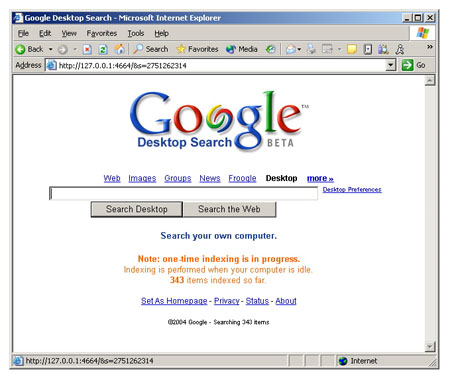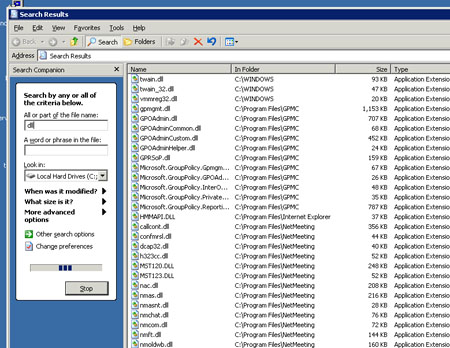I have never paid a cent to Google.
“Google is doing just fine without your money, Rands.”
Someone is paying the bills… who are they?
“Online advertising is the revenue stream at Google. This means that advertisers believe that ads on Google translate into sales of their product and they wouldn’t pay if this wasn’t true. Translation: People buy crap when they see the ad on Google.”
I can honestly say I’ve never purchased anything because of an online ad. Really. Ads bug me.
“Rands… you don’t matter. Google is doing just fine with you yammering about about other stuff.”
Ok. I will. No wait, I won’t.
Google must grow. Whether they choose to provide financial guidance or not, the law of the land is that to get noticed… you must grow. Just ask China.
I’m curiously watching Google to see how they are going to pull this growth off. Obviously, they’ve got the cash to try a lot different things out, but the question is, “Are they Yahoo or are they Microsoft?”
If I was a Google employee and I saw that question, I am calmly climb up on the table in the cafeteria and starting yelling, “RANDS, WE’RE NOT MICROSOFT AND WE’RE NOT YAHOO. WE’RE GOOGLE.” The argument being that Google is a unique thing unto itself… it’s a common misconception amongst the eager and the bright. Netscape felt the same way and they were systematically dismantled by external forces and internal fuck-ups.
Back to my question. Yahoo or Microsoft? Web services or consumer/business software? I, personally, think that Google will wax the floor with Yahoo over the next few years because I believe they’ve already got world-class infrastructure that will provide a majority of the Yahoo-like services… they just need to figure out what premium services folks will pay for and convince those rubes to starting provide credit card information. Maybe their brand is strong enough to just do that and, viola, 10% year over year growth… but that’s boooooring. Been there. Done that.
Google venturing into consumer/business software space is intriguing. Google doing instant messaging… or, better yet, a web browser is a big fat idea. IE competing with GBrowser? Not just yet.
I asked the question several months ago, Can Google UI? The answer is “Google does a fine job with web applications. One might say, they have the most successful web application in the solar system.”
Success with web applications does not mean success on the customer’s desktop.
Exhibit A:

Look familiar? Yeah, it’s a local Google for your desktop. Handy, no? If you’ve got a technical bent, you appreciate the simplicity. Write a local file indexer, making it smart about certain file types (instant messaging, mail), and then use a familiar user interface to present the application to users. Yay! Ship it.
The flaw in this reasoning is simple. Just because I’m willing sacrifice user experience in my web browser does not mean I’m willing to do with my desktop applications. Web applications continue evolve at a nice clip, but web applications are no where near replacing desktop applications in terms of visual sophistication. I’ll summarize: How is it we just figured out how italicize on a web form? We’ve been doing it SINCE 1984 PEOPLE.
Exhibit B and Exhibit C:


That’s the current Windows Search followed by Apple’s forthcoming Spotlight technology. Which of the previous is better or worse is irrelevant. My point is both of these solutions acknowledge that I’ve got lots of processor cycles and, oh yeah, a pretty good graphics card that I want my OS to abuse to give me great user experience. The current Google solution says, “We believe the best solution for searching your computer is our web solution”. And it’s not… at least from a user interface perspective.
Perhaps a better way to explain myself is to take apart the GBrowser meme. Let’s assume that Google hosting the Mozilla developer day was not a happy coincidence and that Google will use some flavor of Mozilla to develop a browser. Let’s also assume that Anil was buzz-word compliant as well as correct when, last year, he suggested that Google should produce, “.. a browser client focused on information retrieval, search, and management is a great first step.”
Drool over that for a moment. A web browser which integrates all that the Google database has to offer. Give me easy access to related information for any web page. Keep an eye on my browser history and offer me content based off my historical wandering. MMMMyeah. I get that. Wait a tick. How are we making money on this? How are we growing the company?
A Google-less Firefox is free. Wait, so is Internet Explorer. Hold on. No one anywhere is making money on browsers because they’re a conduit to e-commerce which is a business model that pays bucks, so that’s gotta be the Google play. They want to increase the number of eyeballs who see their ads. Makes perfect sense until you think about it.
A browser with ads? You must be kidding me. I’ll deal with searches on my own if the Google answer is an ad-laden browser. They must know that, so they’ve got differentiate in another way, right? An innovative new browser that integrates Google information in a manner that we’ve not yet seen. You realize we’re talking about a product that we’ve not yet seen out of Mountain View. We’re talking about a significant piece of compiled code that requires sophisticated interactive design, at least, as good as Microsoft and Apple.
Recent iterations of Firefox’s UI present a fine usable application, but Google’s job is to produce an application for the desktop domain and that means appealing to a class of users who might find Google easy to use (type something — hit return — repeat), but who will bolt the moment a product becames hard to use.
You can not point to any set of downloadable bits that are Google developed and say they provide stellar desktop ease of use.
I am happily looking forward to being proven wrong.
7 Responses